Menu
Troy Scheer began his first semester at the University of Nebraska–Lincoln in the fall of 2018 expecting to take the first steps toward pursuing a degree in computer science.
However, Scheer quickly found that he was pursuing a career he wasn’t truly interested in. He pivoted and found an interest in the field of health sciences but couldn’t pin down a career that truly connected with him.
Scheer spent the next two semesters of his freshman year soul-searching for his calling. Seemingly overnight, he landed on a path toward a career in nursing. Six years later, Scheer is just weeks away from receiving his Bachelor of Science in Nursing degree from the University of Nebraska Medical Center.
“I think I just woke up one day and realized that every day in college was going to be preparing me for my future career,” he said. “In those early days of my undergraduate career, I realized that I wanted to pursue something that I felt like was going to give me the opportunity to directly impact the lives of people and help them in a meaningful way.”
Scheer, a Gretna, Nebraska, native, is in the final weeks of his preceptorship out of the college’s Lincoln division. After receiving his BSN in May and receiving his nursing license in June, Scheer will begin work at Nebraska Medicine as an RN in the neurological specialty unit.
“I’m very excited for the position,” he said. “It’s something that I’ve been looking forward to for a couple months now.”
On top of the new job, Scheer is already planning for his future. He was recently admitted to the PhD in Nursing program through UNMC beginning this fall. Earning his doctorate will help Scheer get one step closer to his goal of preparing future generations of Nebraska nurses.
“I want to dive into the world of nursing research and academia,” he said. “Potentially, I could see myself becoming faculty to someday teach future nursing students.”
The success Scheer has found through UNMC’s nursing program would not have been possible without the support of selfless donors. Scheer was the recipient of several UNMC scholarships, including the Bernice Harris Nursing Scholarship and Nora Parker Linn Scholarship.
He said the impact donor support has on himself and his peers at UNMC is immeasurable.
“Being a student is not an easy path,” Scheer said. “It involves a lot of professional and personal growth, along with the financial burdens that accompany higher education. What may seem like a simple monetary gift really does go a long way in supporting students’ growth and education.”
The future is bright for Scheer. His passion for the field has bloomed over the last two years thanks in large part to the opportunities provided to him through UNMC’s nursing program.
“I’m very proud to be able to call myself a UNMC Lincoln Division nursing student,” he said. “The main reason for that is the faculty. They have provided some of the best interactions I’ve had over the last six years of undergraduate study.”
The school’s focus on implementing information learned during classroom instruction in a hands-on environment has helped Scheer continue to grow as a nursing student.
“You have your didactic classes throughout the week, where you’re in a classroom setting and it’s all very information heavy,” he said. “Then, you’ll turn around the next day and you’ll be bedside in a hospital caring for someone who’s incredibly ill and you’re applying that textbook knowledge.”
Those bedside interactions also helped Scheer realize that he found his passion in nursing.
“The humanity you’re able to witness when you’re in the hospital and you’re helping people that are very ill and vulnerable is such a great feeling,” he said. “I’m very proud of everything I have done thus far in nursing school.”
As he prepares to enter the next chapter of his life, Scheer is proud to call himself a UNMC graduate. The opportunities provided to him over the last two years have set the stage for a lifetime of success, all while making an impact in the lives of those who need it most.
“I believe that my peers and I are quite prepared to enter the field as new graduate nurses and we have our college and faculty to thank for that,” he said. “I’m very thankful for the support that has been given to our college that allows this good work to continue.”
Clayton Harris has always been an extrovert.
He knew from the time he began his first job in high school at Subway that he had a knack for working with people. Now, he’s swapped out subs for scrubs to make a difference in Nebraska’s health care field by joining the next generation of the state’s nursing workforce.
Harris is a first-year Bachelor of Science in Nursing student studying at the University of Nebraska Medical Center’s Norfolk Division. Born and raised in David City, NE, Harris knew he wanted to become the first in his family to pursue higher education. Even before he took his first step on a college campus, Harris knew he wanted to pursue a career in healthcare.
“Being around people all day really energizes me,” Harris said. “I think nursing is the highest form of customer service that’s out there. It allows you to be very personable with other people, as well as just being a source of knowledge whenever they need something.”
After completing his nursing pre-requisites at Wayne State College, Harris took the next step in his nursing career at UNMC’s Norfolk division. He highlighted the college’s culture, saying students are encouraged to approach new challenges head one without fear of failure.
“It’s okay to make mistakes,” he said. “They use that as positive reinforcement to help us grow as students. I think UNMC just does a really great job in fostering that kind of culture.”
When Harris graduates in May 2025, he hopes to use his degree to address a growing shortfall. According to the Nebraska Center for Nursing, the state will experience a workforce shortage of over 5,000 nurses by 2025. 73 of Nebraska’s 93 counties have less than the national average ratio of registered nurses to patients.
He plans on returning to rural Nebraska to make a direct impact in addressing the nursing shortfall, all while helping those who mean the most to him.
“I like smaller communities a little bit more because you can get to know the people in the community a lot faster,” he said. “These are also areas of need, so I just really want to go back and help out rural communities.”
Harris knows the impact donor support has on himself and his peers within the College of Nursing. Whether supporting scholarship opportunities or the variety of other funds spread throughout the school’s five campuses, Harris said donors can play a direct role in impacting the next generation of the state’s nursing workforce.
“No matter where you go for college education, there is going to be that financial barrier and it can just be hard to push through that for some students,” Harris said. “Giving back to the College of Nursing is a great way to support future generations.”
This article was originally written by Bill O’Neill at UNMC
UNMC and its primary clinical partner, Nebraska Medicine, continue to expand their contribution to the state’s economic success.
According to an independent new analysis, the medical center impacts Nebraskans daily — directly or indirectly — through its statewide educational programs, bioscience research and clinical services.
The med center’s economic impact topped $5.9 billion in the last fiscal year, a 34% increase since 2018, according to the report prepared by Tripp Umbach, a national consultant with expertise in economic impact studies. The current economic impact number grows to $6.4 billion annually when considering the academic-related functions (such as residency programs and research) at UNMC affiliates, Children’s Hospital & Medical Center and the VA Health System.
UNMC, Nebraska Medicine and the affiliates also supported more than 56,000 jobs in the Nebraska economy, including not only direct employment, but also indirect jobs created through the supply chain — equipment vendors, construction workers and others.
See the report on the med center’s combined economic impact here.
“UNMC and its clinical partners continue to be an important economic engine for the state of Nebraska,” said Jeffrey P. Gold, MD, chancellor of UNMC and chairman of the board at Nebraska Medicine. “As the medical center increases its already expanding national leadership role in health professions education, research and care, our statewide economic impact will increase as well, further benefiting all of the people of Nebraska for generations to come.”
Throughout the COVID-19 pandemic, the medical center’s experts and educators provided extensive education and infectious diseases expertise to Nebraskans, efforts which stretched far beyond the economic impact, said James Linder, MD, CEO of Nebraska Medicine.
“One reason that the medical center continues to have such a beneficial economic impact on the state is its devotion to health care,” Dr. Linder said. “As medical center experts worked to keep fellow Nebraskans safe and provide reliable, timely and accurate medical knowledge to the country as a whole, the stature of our partnership and the benefits it provides continue to grow.”
Among the report’s findings:
“The state has been steadfast in its support of the mission of UNMC and its partners,” Dr. Gold said. “We see through this report that, apart from helping to meet the health care needs of our Nebraska neighbors, the state’s support advances not only the health and well-being of the citizens of our state, but it provides them a positive economic benefit as well.”
Story from the University of Nebraska at Kearney
A partnership between the University of Nebraska at Kearney and University of Nebraska Medical Center, the proposed Rural Health Education Building in Kearney will further address the need for more health care workers in the state’s rural areas.
The Rural Health Education Building would build upon an existing partnership between UNK and UNMC that’s shown great success. The two institutions opened a $19 million Health Science Education Complex on UNK’s west campus in 2015, and that facility quickly filled to capacity.
The new Rural Health Education Building would allow UNMC to expand its existing nursing programs and bring new options to the UNK campus, including occupational therapy, medical nutrition, genetic counseling and respiratory care – all high-need areas in rural Nebraska.
For the first time, the UNMC College of Medicine would educate physicians in rural Nebraska, and a Master of Health Administration would be added to complement UNK’s undergraduate program.
The Rural Health Education Building would also offer professional development, training and continuing education opportunities for existing health care workers and support research that improves the lives of Nebraskans.
May 6th through the 12th is the yearly celebration of nurses during Nurse’s Week. The past year has been an extremely trying time for nurses and frontline workers across the country but it’s a perfect time to highlight the education and preparedness the UNMC College of Nursing students receive that prepares them for moments like this. Because of these, we sought to give a few students the opportunity to speak to why this past year has solidified their reasoning to pursue this career path and the responses were nothing more than inspiring.
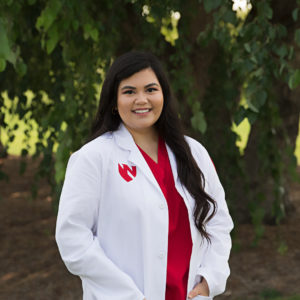
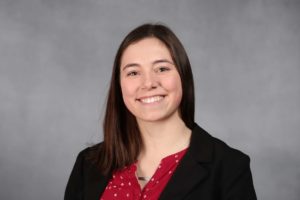
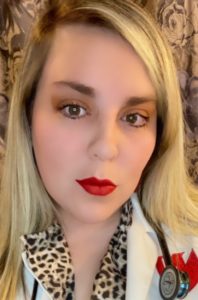
“After continuously seeing the devastation of COVID-19 this past year, my desire to become a nurse has strengthened tenfold. I studied harder than I ever had and made sure there would be nothing standing in the way of me walking the stage to get my BSN. I’d see healthcare workers on the news caring for the sick & knew that I needed to finish strong so I could get out there and help as soon as possible. I am thankful for UNMC College of Nursing – Lincoln for providing me the tools to reach this point.”
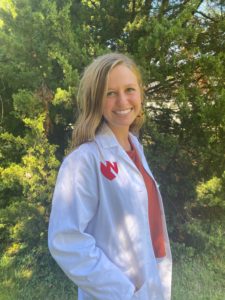
“I’ve wanted to be a nurse since I can remember. My biggest fear entering nursing school was that I would come to realize I didn’t like it or wasn’t cut out for the profession. Man could I have not been more wrong! This year has proven to me that nursing is where I belong and what I’m actually good at! I grew so much more confident in myself and my abilities through my clinical experiences and am no longer fearful, but excited to start my last year of school at UNMC.”
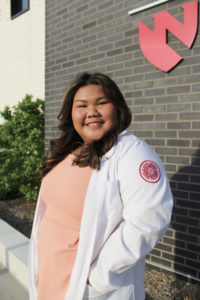
“Although everything was shutting down around me because of the COVID-19 pandemic, my passion and desire to become a nurse was only amplified. It definitely strengthened my resilience too. I had the pleasure to care for a couple of COVID patients during my critical care rotation. I have seen full recovery and families experience tremendous loss. It reminded me of how being a part of someone’s life during his or her most vulnerable time is something so special. Given the difficult circumstances with the past year, I would still choose nursing in a heartbeat.”